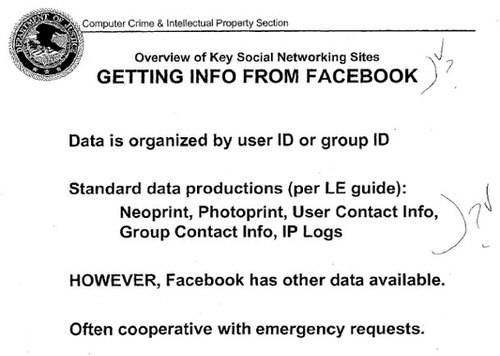The US Department of Justice this week released slides from a presentation deck titled Obtaining and Using Evidence from Social Networking Sites. The document was released in response to a Freedom of Information Act request by the Electronic Frontier Foundation (EFF).

The DoJ presentation describes Facebook as much more co-operative with law enforcement requests for user information than Twitter and MySpace are. Update:Facebook’s Barry Schnitt contests this interpretation of the document, says the company is resistant to illegitimate government requests for user information and offers one example of that resistance in a comment posted below. The document also explains to officers what the advantages of going undercover on social networking sites are. The EFF posted IRS training documents for using various internet tools as well, including Google Street View, but those were much tamer than the Justice file.

Highlights from the deck include:
- On “getting info from Facebook” – options include photos, contact info, group contact info and IP logs. “HOWEVER, Facebook has other data available.” The deck notes that Facebook is “often cooperative with emergency requests.”
- MySpace and Twitter, on the other hand, are described differently. MySpace “requires a search warrant for private messages/bulletins less than 181 days old.” Twitter “will not preserve data without legal process,” has a “stated policy of producing data only in response to legal process” and has no Law Enforcement Guide (or spying manual, as some parties call such documents). Wouldn’t you like your social network to say no before it says yes and require a warrant before handing over information to law enforcement? We reached out to Facebook this evening about the government claim that it was unusually co-operative but have not yet received a response. Update: Facebook has responded in comments below and says that the company is in fact resistant to any requests for user information that it does not believe are an emergency and even then hands over a minimal amount of user data.
- Funny: As social networks go, LinkedIn’s “use for criminal communications appears limited” the document says. You don’t say. LinkedIn can be useful in finding expert witnesses, however.
- “Why go undercover on Facebook, MySpace, etc?” the document asks. Three reasons are offered: 1. Communicate with suspects/targets. 2. Gain access to non-public info. 3. Map social relationships/networks.
- “If agents violate terms of service,” the document asks, “is that ‘otherwise illegal activity’?” No answer is offered in the text.
- “Many witnesses have social-networking pages,” the presentation notes. Those pages can be a “valuable source of info on defense witnesses” and “potential pitfalls for government witnesses.”
- Also funny: DoJ prosectors are urged to “use caution in ‘friending’ judges, defense counsel.”
We expect the Electronic Frontier Foundation to offer further analysis in coming days. You can download a PDF of the document yourself here. For further discussion of these documents, see blog posts clustered on Techmeme.









